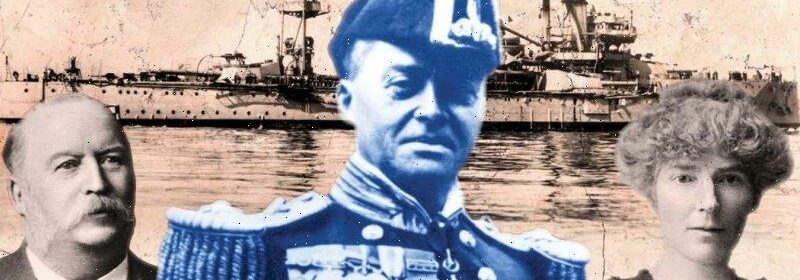Three historical figures and a fictional identity crisis

FICTION
Love, Oil and the Fortunes of War
Paul Ashford Harris
Ventura Press, $32.99
There are novels that sweep you into a narrative so immersive that you forget time. There are novels you don’t finish because you lose interest in the plot or the characters. Then there are novels that have you scratching your head because you have no idea what the book is trying to do. You’re not bored — just confused.
I experienced this last reaction reading Love, Oil and the Fortunes of War, a novel that centres the lives of three real-life historical figures during the years leading up to World War I. Chapters hop between Australia, Turkey (“The Far East”), England and several European cities.
Gertrude Bell (centre) with Winston Churchill (left) and T.E. Lawrence (of Arabia).Credit:
Gertrude Bell was an intrepid, Oxford-educated writer and policymaker who facilitated talks between the British government and Baghdad, conversations that led to the orientalist partitioning of Iraq in 1920. Jacky Fisher was a British admiral, a “demented” and “obsessive nautical genius” who was an expert in torpedoes.
Then there was William D’Arcy — an oil man, who emigrated to Rockhampton in 1865 as a teenager and, in later years helped found the Anglo-Persian Oil Company, which would become BP.
Paul Ashford Harris traces their lives separately for much of the novel’s first half: Bell’s upbringing in England, Fisher’s Navy training and D’Arcy’s first years in central Queensland.
Credit:
I really wanted to like this book. I was intrigued how three wildly different persons from three wildly different disciplines would “collide” — as the book’s blurb promised.
But it turned out to be one of the most confusing reading experiences I’ve ever had. The book suffers for its lack of narrative direction and its dissonant intentions. Most of it is plotless. Instead of intrigue and tension, we have scenes that dissolve the minute their scaffolding is laid out.
A summary of D’Arcy’s adolescence is followed by a scene set without any exposition or context. A paragraph about Bell’s personality is followed immediately by: “One afternoon she stopped to rest on a bench overlooking a small lake…” I didn’t know the age she was, what time it was, where this lake was. Everything felt unmoored.
The absence of any sense of consistency in time or pacing was jarring. Too many minor characters crowd the story. The dialogue was often laboured.
The novel picks up towards the middle, when the protagonists finally cross paths. The writing is more evocative and taut. Here, Harris delivers what readers of historical fiction look for in the genre: an immersive fantasy of the past told through the eyes of hyper-charismatic yet familiar characters.
William D’Arcy: an oil man, who emigrated to Rockhampton in 1865 and later helped found the Anglo-Persian Oil Company.Credit:
Harris is at his best when his narration congeals around a single point of entry — a description of the corporeal musk of heat the early “free settlers” experienced in the first years of emigration, for instance, which elevates the story like a gear change.
Ultimately though, the book has an identity crisis. It reads like a collection of loosely patched-together historical research trying to be a novel.
Is it interested in maritime history? Oil history? Is it an environmental manifesto? A history of colonisation from the colonisers’ perspective? It can’t be that interested in colonisation because it centres the story from the perspective of the colonisers, authored by someone living in a colonised country – so to not address this most proximate colonisation of all would have been remiss.
The novel offers a strange, frustrating reading experience, only because it is confident about the white perspective and shies away from the experiences of indigenous people whose lands were colonised by the British Empire. I have to believe it is possible to tell a story about white people without compromising the humanity of those harmed (directly or indirectly) by the actions of those in power.
The Booklist is a weekly newsletter for book lovers from books editor Jason Steger. Get it delivered every Friday.
Most Viewed in Culture
From our partners
Source: Read Full Article


